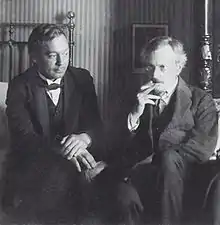J. V. Uspensky | |
|---|---|
 Delaunay (left) with Uspensky | |
| Born | Yakov Viktorovich Uspensky (Russian: Яков Викторович Успенский) April 29, 1883 |
| Died | January 27, 1947 (aged 63) San Francisco, United States |
| Alma mater | University of St. Petersburg |
| Scientific career | |
| Fields | Mathematics, Number theory, Probability theory |
| Institutions | Stanford University, University of Minnesota |
| Doctoral advisor | Andrey Markov[1] |
| Notable students | |
James Victor Uspensky (Russian: Яков Викторович Успенский, romanized: Yakov Viktorovich Uspensky; April 29, 1883 – January 27, 1947) was a Russian and American mathematician notable for writing Theory of Equations.[2][3]
Biography
Uspensky graduated from the University of St. Petersburg in 1906 and received his doctorate from the University of St. Petersburg in 1910. He was a member of the Russian Academy of Sciences from 1921.[4]
Uspensky joined the faculty of Stanford University in 1929-30 and 1930-31 as acting professor of mathematics. He was professor of mathematics at Stanford from 1931 until his death.[4] Uspensky was the one who kept alive Vincent's theorem of 1834 and 1836, carrying the torch (so to speak) from Serret.[5]
Books
- Uspensky, J. V. (1948). Theory of equations.
- Uspensky, J. V.; Heaslet, M. A. (1939). Elementary Number Theory.
- Uspensky, J. V. (1937). Introduction to mathematical probability.
Notes
- ↑ James Uspensky on the Mathematics Genealogy Project
- ↑ J. V. Uspensky (1948). Theory of Equations. Pp. vii. 353. New York: McGraw-Hill Book Co.
- ↑ Kenneth May (1949). "Book Review: Theory of Equations, by J. V. Uspensky". Popular Astronomy. 57: 46. Bibcode:1949PA.....57...46M. .
- 1 2 Royden (1988).
- ↑ Uspensky's biography Archived 2020-10-07 at the Wayback Machine (in Russian).
References
- J. V. Uspensky (1931). "On Ch. Jordan's Series for Probability". Annals of Mathematics. Second Series. 32 (2): 306–312. doi:10.2307/1968193. JSTOR 1968193.
- J. V. Uspensky (1926–1927). "On the Development of Arbitrary Functions in Series of Hermite's and Laguerre's Polynomials". Annals of Mathematics. Second Series. 28 (1/4): 593–619. doi:10.2307/1968401. JSTOR 1968401.
- Halsey Royden (1988). The History of the Mathematics Department at Stanford, in A Century of Mathematics in America edited by Peter L. Duren, Richard Askey, and Uta C. Merzbach. American Mathematical Society, History of Mathematics Volume 2, Providence, Rhode Island. "A History of Mathematics at Stanford" by Halsey Royden.
External links
This article is issued from Wikipedia. The text is licensed under Creative Commons - Attribution - Sharealike. Additional terms may apply for the media files.